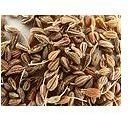Aniseed Benefits for Well-Being
What Is Aniseed?
Aniseed comes from the flowering plant, Pimpinella anisum. It is indigenous to the eastern Mediterranean, parts of North Africa, and western Asia, where it grows in the wild. With a licorice-like aroma, medicinal benefits, and uses in cooking and baking anise is a popular herb.
The seeds are rich in beneficial volatile oils, namely anethole, as well as fatty acids, and flavonoids. Making a tea from the dried seeds you can enjoy the many aniseed benefits, from improving digestive health to warding off harmful microbes. With a pleasing smell and taste there is no reason not to include this healing herb in your diet to improve overall well-being.
Digestive Benefits
Anise tea is a well known remedy for common digestive problems. The volatile oils give the seeds their carminative properties, easing gas, upset stomach, and indigestion. With anti-spasmodic properties as well, aniseed helps to calm the stomach. To make a cup of tea gently crush the dried seeds. Use one to two teaspoons and steep in one cup of boiling water for about ten minutes, covered. Drink slowly before meals. Aniseed blends well with fennel and caraway for treating digestive issues.
Respiratory Benefits
Aniseed is also a natural remedy for respiratory infections in general, benefiting bronchitis and irritating coughs. With expectorant properties it promotes the expulsion of mucus from the respiratory tract. As an anti-spasmodic it will help to quiet coughing. An anti-microbial herb as well, drinking a cup of aniseed tea can also help to fight the infection that is causing the symptoms in the first place. For respiratory problems drink up to three cups daily. Aniseed blends well with coltsfoot and white horehound for bronchitis, sinusitis and other related issues.
Anti-Infective
The volatile oils in aniseed are anti-microbial. Anise is therefore useful for combating and preventing infections. Try blending with other aromatic, anti-microbial herbs such as clove and cinnamon for enjoyable and beneficial teas to help the body fight common bacterial and viral infections.
Aniseed for Women
Aniseed is also a useful herb for women. It can be used to help stimulate the flow of breast milk in nursing mothers. Drinking anise tea is also known to help manage menopausal symptoms. This may be because some of the phytochemicals found in the seeds have a gentle estrogenic effect on the body.
From calming the stomach to protecting the body from infection the many aniseed benefits make this herb an invaluable addition to your diet. This herb is considered to be safe, even for pregnant women, although it is not recommended to take in excess as the effects of high doses are unknown. Enjoy a cup of tea before meals; keep some of the dried seeds on hand during cold and flu season, or simply enjoy the licorice-like flavor in herbal tea blends or even for cooking and baking.
References
Herbs 2000 https://www.herbs2000.com/herbs/herbs\_anise.htm
Hoffmann, David. “The Complete Illustrated Holistic Herbal: A Safe and Practical Guide to Making and Using Herbal Remedies.” (Element Books, 1996).
Balch, Phyllis, CNC. “Prescription for Nutritional Healing, 4th Edition.” (The Penguin Group, 2006).
photo by David Monniaux
Disclaimer
Please read this disclaimer regarding the information contained within this article.
